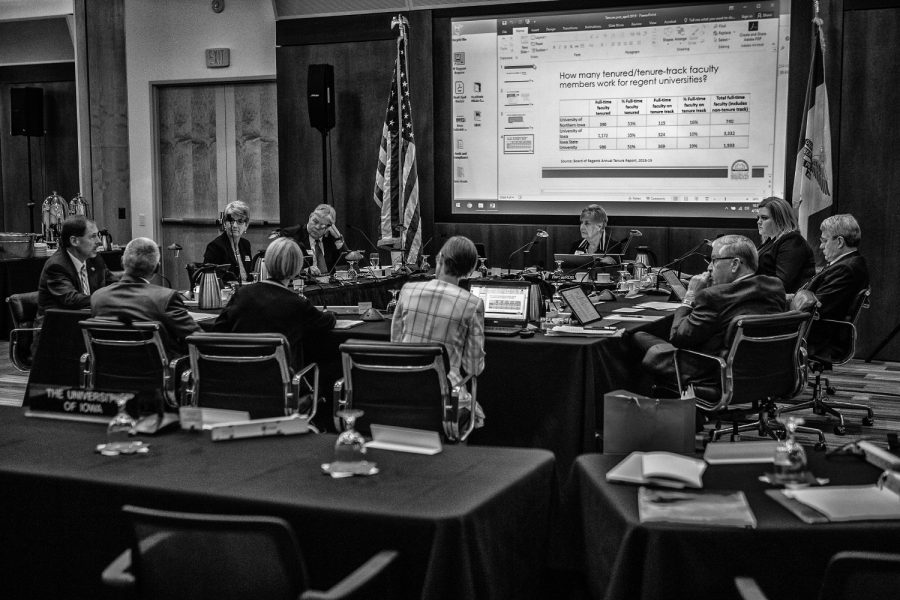Iowa regents’ report shows slight increase in nontenure-track faculty
Fifty-five percent of UI faculty are on the nontenure-track, a slight increase from 52 percent in 2016-2017.
April 21, 2019
The number of nontenure-track faculty at the University of Iowa is continuing on a slightly upward trend, a report from the state Board of Regents shows.
According to the report, 55 percent of 3,332 UI faculty members are classified as nontenure-track, meaning they are appointed for a specific duration of time and their appointments may not be renewed once those terms end. That number has increased from the 52 percent of UI faculty members who were classified as nontenure-track in the 2016-17 academic year.
Of the 3,332 faculty members, 1,172 are tenured, 324 are on tenure-track, and 1,836 are nontenure-track, according to the report.
The faculty members with tenure-track positions serve six-year probationary periods in which candidates undergo comprehensive and extensive reviews. Being awarded tenure requires an affirmative recommendation that involves reviews from peers in and outside the university.
“The protections that tenure provides really are also emphasized by the strategic plan for the board,” Regent Chief Academic Officer Rachel Boon said during the April 18 meeting. “The board’s strategic plan includes a core value of academic freedom. It also includes a priority around academic excellence, research excellence, and tenure really is a portion of what it takes to do that.”
Bills introduced in the state Legislature have taken aim at the tenure system at Iowa’s public universities, proposing that tenure be eliminated. Those bills — proposed in both 2017 and again in the current legislative session — have not advanced through either chamber of the Legislature.
RELATED: Bill to end tenure at Iowa regent universities advances in the Iowa Legislature
Boon said that after the probationary period ends for tenure-track faculty, a year is spent moving everything forward with committees at the college level for review. Then the decision is forwarded to the provost and the president before it is brought to the regents, she said.
Even after faculty members receive tenure, they will go through post-tenure reviews annually and external reviews periodically, Boon said. Students also continually evaluate faculty members, she said.
The proportion of UI tenure-track faculty appears lower compared with other institutions in its peer group because of the number of clinical faculty employed by UI Hospitals & Clinics who aren’t on a tenure track, interim Provost Sue Curry said.
In comparison with other universities in the Big Ten and in the UI’s peer group, the UI is about in the middle for the number of tenured faculty, Associate Provost for Faculty Kevin Kregel said.
The UI has experienced a trend of declining numbers of tenure-track faculty and an increase in clinical faculty at the UIHC, he said.
The UI does national searches for faculty from other universities, as well as at the UI, to fill positions, Curry said. The university faces many challenges when recruiting faculty, such as the expense of recruiting senior faculty and having three-year tenure-track faculty “poached” by other universities, she said.
“The convention, and I think it’s a good one, is that you go out and do a national search so that you have the right mix of focuses and expertise and people who will bring new perspectives to research areas and teaching focuses,” Curry said.






